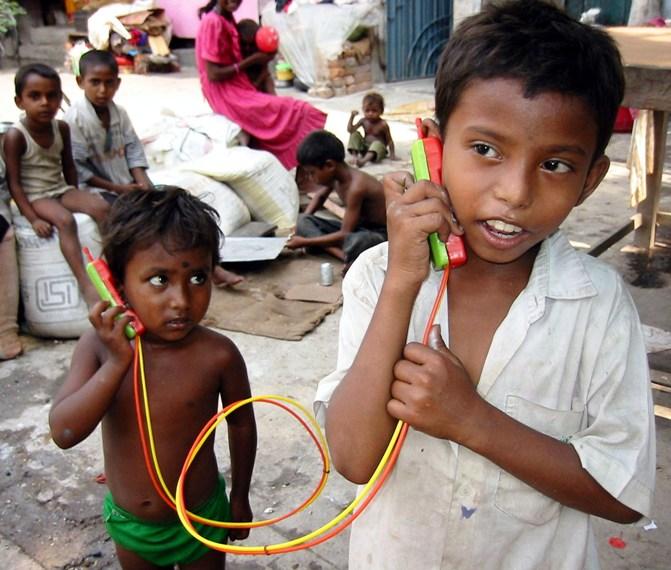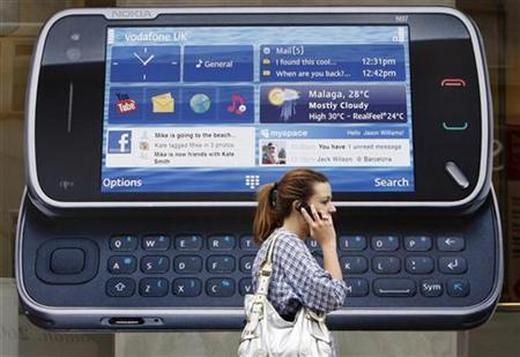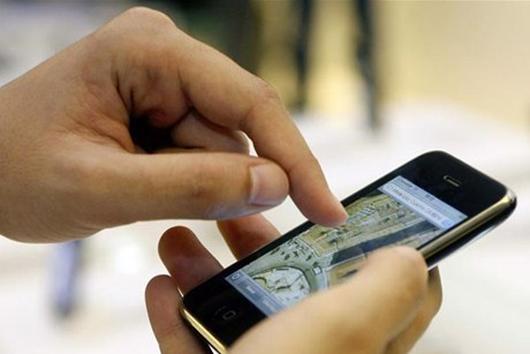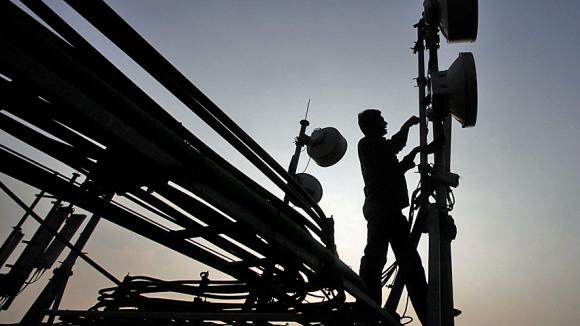Photographs: Jayanta Shaw/Reuters Dev Chatterjee in Mumbai
Tata Teleservices Managing Director N Srinath is a worried man.
The Tatas, who were the first to enter the telecom space in 1996, are today struggling to turn in a profit.
To make things worse, the company’s net worth, for the first time, has turned negative by Rs 1,863 crore (Rs 18.63 billion).
The returns on investment remains negative, while the road ahead looks bumpy.
“Let’s not look at the first 15 years of our telecom journey as we changed our course completely by becoming a GSM-technology player from a CDMA-based player just five years ago,” says Srinath.
Encouragingly, the company is attempting a U-turn.
“Due to the legacy issues and the changed policy environment in the telecom sector, our performance was impacted but we are now turning around and hope that the worst is behind us,” says Srinath.
The story of woe for the Tatas has to do, in part, with complex government policies, unfriendly regulatory environment, multiple players competing for every customer and the infamous 2G scam which has scared investors away.
. . .
Amid losses, Tata Tele scrambles for a saviour
Image: A visually impaired girl uses her mobile during a protest in New Delhi.Photographs: Adnan Abidi/Reuters
The long view
The Tatas entered the sector in 1996 and were later joined by the Birlas and AT&T as partners.
In 2000, Tata, Birla and AT&T together formed a venture that later became Idea Cellular. However, the partners soon fell out with each other.
AT&T exited the venture in 2005, while Tatas left it in 2006 to start their own CDMA-based (code division multiple access) business.
The selection of CDMA technology was the biggest mistake of the company as changes in technology made GSM-based (global system for mobile communications) wireless phone services cheaper and better.
By the time, the Tatas changed course in 2009, other players like Bharti Airtel and Vodafone had taken a giant leap forward via mergers and acquisitions.
In financial year 2012-13, Tata Teleservices’s CDMA-based voice revenues fell 22 per cent from a year before.
. . .
Amid losses, Tata Tele scrambles for a saviour
Image: A ragpicker holds her mobile phone to show a picture she took at a dump yard in New Delhi.Photographs: Adnan Abidi/Reuters
In a bid to reinstate its position, the company sold 26 per cent stake to Japanese telecom giant Docomo in 2009 and launched third-generation (3G) services in 2012 in partnership with the Japanese firm.
But it is still to become a sizable player.
In spite of the course correction, Tata Teleservices posted a net loss of Rs 4,858 crore (Rs 48.58 billion) in the year ended March 2013, while its debt rose to Rs 23,491 crore (Rs 234.91 billion) from Rs 19,299 crore (Rs 192.99 billion) in the previous year.
In comparison, Idea Cellular made a profit of Rs 818 crore (Rs 8.18 billion) while Bharti Airtel registered a profit of Rs 5,096 crore (Rs 50.96 billion).
Bankers attribute the weak performance to increased competition in the wireless telephony industry and a fall in revenues from its CDMA services.
This, along with high finance costs, contributed to the growing losses, they say.
However, the company’s troubles don’t end there.
The net worth of another of its joint venture, Virgin Mobile India, has also completely eroded. Tata Telseservices investments worth Rs 649 crore (Rs 6.49 billion), if not recovered, will impact the parent company’s financials.
. . .
Amid losses, Tata Tele scrambles for a saviour
Photographs: Luke MacGregor/Reuters
To salvage the situation, bankers say the company is expediting talks with a number of players to merge its operations.
It was reportedly in talks with Norway-based Telenor and Malaysia’s Maxis owned Aircel to merge its operations once the government comes out with the new merger and acquisition guidelines for telecom companies.
The rush to sell the business is also being prompted by a shift in thinking at the Tata group.
Tata group insiders say, the loss-making sector is no longer a priority for the group’s new chairman, Cyrus Mistry, especially as more lucrative opportunities are emerging in realty, infrastructure and aviation.
A controversy surrounding group company Tata Reality’s investment in Unitech Wireless has also played a role in turning the tide against the sector.
. . .
Amid losses, Tata Tele scrambles for a saviour
Image: Prem (3), the son of an idol vendor, plays with a mobile phone in front of the idols of Hindu god Krishna.Photographs: Ajay Verma/Reuters
Tata Realty had invested Rs 1,700 crore (Rs 17 billion) in Unitech Wireless and is now being probed by Serious Fraud Investigation Office.
According to the government norms, an existing telecom player is barred from buying more than 10 per cent stake in another company in the sector.
Signs of change
One good news for the company is that there is an improvement in the regulatory environment.
The government has announced sharp cuts in spectrum pricing: prices for 900 MHz has been brought down by 67 per cent and that for 1800 MHz by 37 per cent.
Tata Teleservices earnings before income, tax and amortisation too has turned positive in the last two quarters.
Also, agreeing to a long-pending demand of the sector, the government is set to overhaul the M&A guidelines to facilitate buying and selling of companies in the sector.
. . .
Amid losses, Tata Tele scrambles for a saviour
Photographs: Reuters
The current Telecom Regulatory Authority of India Chairman Rahul Khullar is also likely to take a more liberal approach to increasing tariffs in light of the sector’s debt of about Rs 200,000 crore (Rs 2,000 billion).
For Tata Teleservices, the next one year will be the make or break year.
With new M&A guidelines in place by November, the company will either get taken over by a competitor or get merged with others.
This may help the Tatas cut their losses and exit the sector.
“We are ready to buy a company or sell if the price is right,” says Srinath.
The company’s focus has now turned to investing more in high quality 3G-based services and is merging its key back-end operations with Tata Communications (erstwhile VSNL) so that networks are not duplicated, therefore saving on operational capex.
The enterprise vertical, which contributes almost 25 per cent to its revenues, will remain the focus area.
What the company will not do is to renew its CDMA licences when it comes up for renewal.
It will also get its CDMA customers to migrate to GSM-based services so that the network’s technology platform remains undivided.
. . .
Amid losses, Tata Tele scrambles for a saviour
Photographs: Mahesh Kumar A/Reuters
The company is keen to bid for spectrum in Delhi and in the Rajasthan circle where it does not have any presence.
With lenders reluctant to fund this, the company will have to look at its parent Tata Sons, which owns 60 per cent stake in the company, to pay for the spectrum.
Tata Teleservices is also venturing into new areas like home surveillance, smart tracking solutions and other machine-to-machine services.
M-commerce is another such area; it has already started money remittance service in 12 cities.
However, before participating in the spectrum auction, Srinath says, it’s important to get clarity on the M&A guidelines to help the company finalise its partners.
Its clear that Tata’s telecom play depends on how the M&A pans out in the sector and whether it finds a saviour.
The question is what will be the course of Tata Teleservices journey if it does not find a suitor?
Timeline of Tata Tele’s journey
- 1995: Tata Teleservices is incorporated
- 1999: Launches basic services using CDMA technology in AP
- 2002: Offers basic services in Gujarat, TN, Delhi, Karnataka
- 2003: Buys Hughes Telecom in Maharashtra circle
- 2003: Migrates to unified assess service licence
- 2007: Offers NLD
- 2009: Gets GSM spectrum
- 2009: Docomo buys 26% stake
- 2010: Wins 3G spectrum in 9 circles, including Maharashtra









article